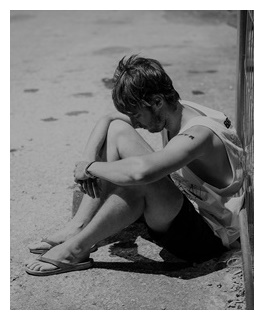By Kotie Geldenhuys
"When growing up in an environment where your father does not care about you and never gives you a pat on the back saying 'well done', it open doors for gangsterism. The gang leader will take on that role. He will tell you 'well done'. That is how gangs are built on the Cape Flats. It is not boys that woke up one morning and decide today we are going to become a gang. It is a process" - Clint Luikes, whose father was a drug addict who abused his mother while he was watching (Showmax, 2022a).
Clint Luikes's statement highlights the significant impact that the "father wound" can have on a child's development. When a child grows up in an environment where they feel unwanted or unappreciated, they may seek validation and a sense of belonging elsewhere, such as through gang involvement. In the absence of positive role-models, gang leaders may step in and fill that void by offering a sense of identity, purpose and belonging to young people who feel lost or disconnected. The sense of loyalty and camaraderie that gangs offer can be particularly alluring to young people who lack these qualities in their home life.
Fathers play an important role in a child's life, but unfortunately, not all children have had positive experiences with their fathers. Some may have grown up without a father figure, while others may have had a father who was physically present but emotionally absent or abusive (Diamond, 2023).
During an interview with Ivor Swartz (refer to the article published from p32 in this issue of Servamus), he referred to the term "father wound" which leaves many children with feelings of rejection. In his book, Seuns sonder pa's (English: Boys without fathers), Julian Jansen wrote that he was left with a father wound (Jansen, 2021). In the preface of her book, Gangster, Carla van der Spuy wrote: "Nog 'n oorsaak is die tekort aan vaderlike rolmodelle. Die pa het dikwels padgegee of hy is wel daar, maar hy is nie betrokke nie. Die seuns kom in opstand teenoor die sogenaamde 'voorskootbeginsel' en huishou-dings met 'n vrou aan die hoof, en hulle besluit dan om 'macho' te wees. Jy word deel van 'n groep. Jy behóórt. Jou 'broers' sal na jou omsien" (English: Another cause is the lack of fatherly role-models. The father often left or he is there, but he is uninvolved. The boys revolt against the so-called 'apron principle' and household headed by a woman. They then decide to be 'macho'. You become part of the group. You belong. Your 'brothers' will take care of you) (Van der Spuy, 2021). In the book a former gangster said: "Ek kom uit 'n broken home. Niks ma nie. Niks pa nie ... Maar toe ek na die gang toe gaan, toe belong ek ... " (English: I come from a broken home, without a mother or a father … but when I went to the gang, I belonged …). Another one noted. "Ja, hy was 'n absent father. Toe kyk ek natuurlik op al die verkeerde plekke na aanvaarding …" (English: Yes, he was an absent father. So, I searched for acceptance in all the wrong places) (Van der Spuy, 2021). The list of children, especially boys, who were left with a "father wound" is never-ending.
*****************************
[This is only an extract from an article published in Servamus: June 2023. The rest of the article explains the concept of the “father wound”; fatherless children; the effect of an absent father; the link to crime; the different ways that people are affected; and finding another father figure. If you are interested in reading the rest of the article, send an e-mail to: This email address is being protected from spambots. You need JavaScript enabled to view it. or a WhatsApp or SMS message to: 078 712 1745 to find out what you need to do to acquire the article. Ed.]